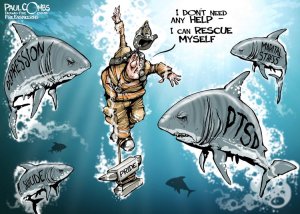Tags
Colossians 1:16-17, History of PTSD Awareness Day, How does faith intersect trauma?, Isolation kills the human spirit, Loneliness, PTSD, PTSD Awareness Day, Shell Shock
At one time I was the PTSD Team Coordinator for the Fire Department. Behind the scenes I worked to get a select number of firefighters together who had the personal qualities for this team, ready to be trained, and ready to “debrief” or “defuse” firefighters after a particularly traumatic event. One might think every call is a traumatic event. While it is for the person suffering an emergency, firefighters and first responders generally can gradate calls from ordinary to extraordinary.
It is the extraordinary event – a call so horrific that a person may be flooded – where their ability to process has been overcome. But each emergency is received differently: what might be ordinary to one, may be extraordinary to another.
What happens when the rescuers needs rescuing?
In a proud work culture of self reliance and among highly trained rescuers, what is a person to do when they feel they can’t admit they’ve been traumatized?
Paula Brown writes:
“Recognizing PTSD is really recognizing it as a significant mental health diagnosis,” said Tim Smith, program manager at Canadian Mental Health Association (CMHA). “It [PTSD] has a significant impact, for most individuals the impact is across their life. It impacts work, personal relationships, long-term planning and goal setting. Some folks diagnosed find ways of coping and managing quite effectively, but for those that don’t it can be pretty debilitating to deal with.”
“Trauma is a personal experience,” explained Smith. “You might have 10 people that are involved in a car accident and eight people walk away without any symptoms of trauma but two people do because it’s based on their personal experience.”
Individuals working in occupations with increased exposure to traumatic events such as first responders, armed forces personnel, and public safety personnel tend to see PTSD more prevalently. Women, refugees, and Indigenous peoples are also statistically at higher risk.”
It’s not about strength versus weakness or it’s not about capacity, it’s about different people working through issues differently and needing to respect that some people get through it ok and some people are struggling,” said Smith.
“Stigma around mental health is a barrier for some people to access resources in the community so it’s an important conversation for everybody. Statistics tell us that one in five Canadians will have a mental health concern at some point in their lifetime, we all know somebody who’s dealing with a mental health issue. I can’t be burdened with stigma…”
… we need to be open and honest, and help people deal with their mental health issues exactly the same way we help people deal with their physical health issues.
History of the National PTSD Awareness Day
“PTSD in some form or another has long been documented in humans. The earliest known literature about the disorder is a poem from 50 BC. Hippocrates narrated a traumatic battle experience about a soldier who was haunted by PTSD-like combat flashbacks. PTSD has consistently been mentioned since then, notably during the Hundred Year’s War between England and France, and even in the literature of Shakespeare — including Romeo and Juliet.
A new understanding of PTSD came with the Civil War in the 1800s, as the disorder became widespread in the traumatized country. It was in 1915 that some understanding of PTSD was formally introduced into medical literature, under the name “shell shock.”
World War 1 threw the disease into the spotlight, and rudimentary treatments, like electric shock therapy, were attempted. It wasn’t until the 1950s that more modern treatments, like group therapy, were introduced.
The Vietnam War issued in, yet again, a new understanding of the disorder. This coincided with research done by psychologists on both Holocaust victims and rape victims, which helped prove that many kinds of trauma can lead to PTSD.
Today, it’s considered largely treatable, so we’ve made a lot of progress. The U.S. Senate recognized June 27 as National PTSD Awareness Day at the urging of Senator Kent Conrad. Conrad wanted to honor a North Dakota National Guard member who had committed suicide after two tours of duty in Iraq. In 2014, the entire month of June was designated National PTSD Awareness Month by the Senate.”
How does Faith Intersect Trauma?
In the same way that faith is best exercised in community, so is trauma best debriefed in camaraderie (brotherhood & sisterhood). The worst thing a person can do is to isolate. This is true whether you have experienced trauma or not – loneliness kills the human spirit.
Often we need others for real encouragement from people who care, and we need to know the One who holds it all together:
For in him all things were created: things in heaven and on earth, visible and invisible, whether thrones or powers or rulers or authorities; all things have been created through him and for him. He is before all things, and in him all things hold together.
For more information on how to help a person with PTSD, see the CMHA pamphlet: “Post Traumatic Stress Disorder.“


Very helpful overview, thanks Rusty. Holding, and finding I am held. Community (Jesus and his close followers) is the key for me, in good but sensitive doses. Blessings.
LikeLiked by 2 people
Love the phrase: “holding and finding I am being held” – – a beautiful summary of the reality of our spiritual lives.
LikeLiked by 2 people
Pingback: PTSD Awareness – Dopamine